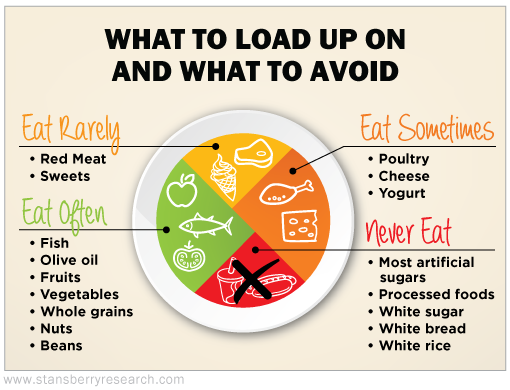It's January, which means no one is eating the office cookies.
Each new year, folks make resolutions to lose weight. They want to try the latest, greatest diet trend that promises to slim you down in just a few weeks.
You can't go anywhere without hearing about it. In fact, one of my researchers just had someone at the nail salon tell her all about the Whole30 diet. It's a diet where you get rid of sugar, dairy, grains, and legumes for 30 days. Then you start reintroducing them to your diet. It's supposed to be a quick fix to "reset" your metabolism.
Here's the thing... that kind of restrictive diet sets most of us up for failure. That's one reason so many folks fail to keep their New Year's resolutions each year.
Each year, U.S. News and World Report ranks the best diets. It looks at factors such as ease of use, nutrition content, weight-loss efficacy, and benefits for folks with diabetes and heart disease.
This year, for the first time, our favorite diet tied for first place. The Mediterranean diet features lots of fish, olive oil, vegetables, and even some red wine. We've written many times about the benefits, including its ability to...
- Slow age-related brain decay
- Reverse erectile dysfunction
- Lower risk of cancer
- Boost the immune system
- Protect heart health
Also in first place is the DASH diet, which physicians specifically designed for folks with high blood pressure (it stands for Dietary Approaches to Stop Hypertension).
DASH is similar to the Mediterranean diet, but emphasizes cutting fatty foods, reducing salt, and improving your intake of calcium and potassium. This last part often gets overlooked in practice, as folks simply opt for low-fat options and cut salt out completely.
Remember, low magnesium and potassium levels in Americans' diets are probably a major component of high-blood-pressure problems. That's because these minerals are just as important as sodium for regulating blood pressure. Three foods that pack in potassium and magnesium all at once are fish, avocados, and bananas.
Cutting out salt completely is also dangerous. Some people cut down way too much on their salt intake, which leads to even worse health problems, including hyponatremia.
Hyponatremia, a condition caused by abnormally-low levels of salt in the blood, causes everything from muscle cramps to confusion and nausea. It can affect the nerves and inhibit walking. And it's one of the leading causes for falls in the elderly.
One thing we like about both diets is their emphasis on fruits and vegetables. The more you get every day, the lower your risk of premature death or cancer, with 10 servings being ideal.
Frankly, we hate diets. They're restrictive and hard to follow. But if you want to try one this year, we suggest the Mediterranean diet. A simple day could include fruit and yogurt for breakfast, a nice salad with nuts and an olive oil dressing for lunch, and beans and fish for dinner. Check out this table to see what to load up on and what to avoid...
There's plenty of flexibility with this diet. The key of course is to avoid inflammation-triggering foods. Inflammation is the root of so many medical problems, including heart disease and diabetes. These foods include artificial sugar, processed foods, and the white killers (white sugar, white bread, and white rice).
Artificial sweeteners trigger inflammation and may contribute to diabetes. The only sugar replacement we've seen that we like is stevia, which is a natural, plant-based sweetener. But it may interfere with blood pressure, so we don't recommend using it if you're on blood-pressure medicine.
We know following diets can be tricky. So even if you fall off your diet this year, making this one change will still keep you healthy: Cut out the inflammation-causers. You'll have a better 2018 as a result.
[optin_form id="73"]
- The full review of diets from U.S. News and World Report.
- Our takedown of sugar substitutes.
- Something different: Would you get silver in your teeth?
Here's to our health, wealth, and a great retirement,
Dr. David Eifrig and the Health & Wealth Bulletin Research Team
Baltimore, Maryland
January 11, 2018

